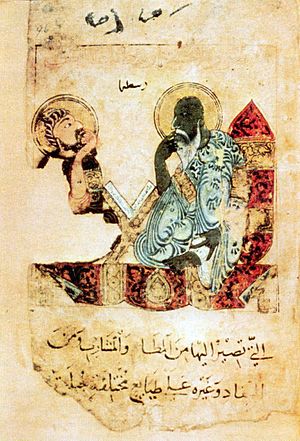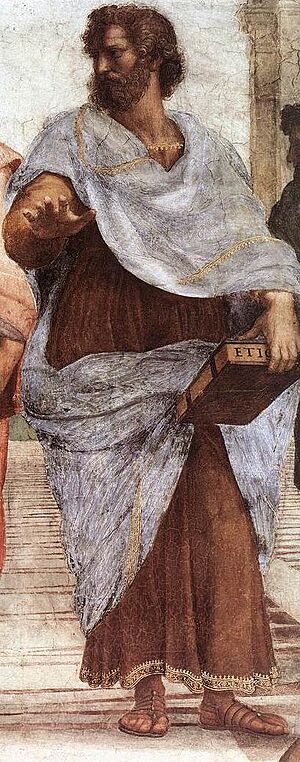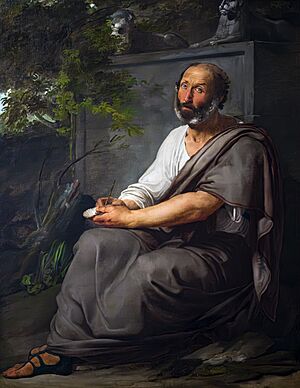Aristotelianism facts for kids
Aristotelianism is a way of thinking based on the ideas of an ancient Greek philosopher named Aristotle. He lived a long, long time ago, from 384 to 322 BC. His ideas cover many topics, like how we think (logic), how the world works (science and nature), and how we should live our lives (ethics).
Aristotle believed in using careful thinking and observation to understand things. He also thought that everything has a purpose. Living a good life, he said, means developing good habits, which he called "virtues." Many different thinkers throughout history have been inspired by Aristotle's work.
Contents
History of Aristotelianism
Ancient Greek Thinkers
Aristotle's first students were part of the Peripatetic school. They continued his research and worked to keep his ideas safe. Important figures like Theophrastus and Strato of Lampsacus followed in his footsteps. Later, during the Roman era, Alexander of Aphrodisias wrote many notes explaining Aristotle's writings.
Around the 3rd century, a new group of philosophers called the Neoplatonists became popular. They tried to mix Aristotle's ideas with their own.
Ideas in the Islamic World

During the Islamic Golden Age, many important books from ancient Greece were translated into Arabic. This happened in places like the House of Wisdom in Baghdad. Scholars like Hunayn ibn Ishaq helped translate Aristotle's works.
This made Aristotle's ideas available to many Muslim thinkers. Al-Kindi (801–873) was one of the first Muslim philosophers to bring Greek ideas into Islamic thought. He helped make Aristotle's philosophy popular in the Muslim world.
Another very important philosopher was Al-Farabi (872–950). People thought he was second only to Aristotle in his knowledge. His work helped set the stage for Avicenna (980–1037), who was a major interpreter of Aristotle. Avicenna's ideas, called Avicennism, mixed Aristotle's thoughts with other philosophies.
Later, in Spain, Averroes (1126–1198) became famous for his many notes and explanations of Aristotle's books. His writings had a huge impact on thinkers in Europe.
Aristotle's Return to Western Europe
For a long time after the Roman Empire fell, most of Aristotle's works were lost in Western Europe. Only a few of his logic books were known.
But in the 12th century, European scholars started looking for new knowledge. They found many of Aristotle's books in places that had been under Muslim rule, especially in Spain. Translators like James of Venice and Gerard of Cremona worked hard to translate these Greek and Arabic texts into Latin. Gerard of Cremona alone translated 87 books, including many of Aristotle's important works on science and nature.
At first, some of Aristotle's ideas about nature caused problems because they seemed to go against church teachings. In Paris in 1210, it was even forbidden to read his books on natural philosophy. But this ban didn't last long, and by 1270, his ideas were widely studied.
William of Moerbeke (around 1215–1286) made new, complete translations of Aristotle's works directly from Greek into Latin. This helped clear up any misunderstandings from earlier translations.
Two very important scholars, Albertus Magnus (around 1200–1280) and his student Thomas Aquinas (1225–1274), helped combine Aristotle's philosophy with Christian beliefs. Albertus Magnus explained and organized Aristotle's ideas in a way that fit with church teachings. Thomas Aquinas, who was a student of Albertus, wrote many notes on Aristotle's works. He used Aristotle's ideas to understand the physical world, how we learn, and how we should live. The way of thinking that came from Thomas Aquinas is called Thomism.

Aristotelianism Today
Ethics and Virtues
Many modern thinkers who follow Aristotle's ideas focus on virtue ethics. This is the idea that living a good life means developing good character traits, like honesty, courage, and kindness.
A famous philosopher named Alasdair MacIntyre helped bring back the idea of virtue ethics with his book After Virtue. He argued that humans achieve their best when they take part in social activities and practices. MacIntyre believed that Aristotle's ideas offer the best way to understand what makes a good person and a good society.
See also
- Aristotelian ethics
- Aristotelian physics
- Commentaries on Aristotle
- Corpus Aristotelicum
- Phronesis
- Platonism
- Wheel of fire
 | Jewel Prestage |
 | Ella Baker |
 | Fannie Lou Hamer |


